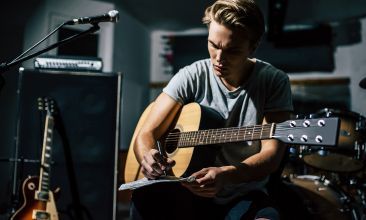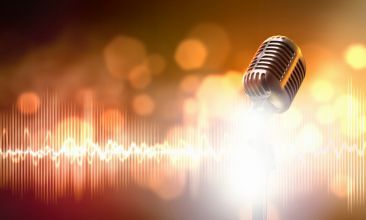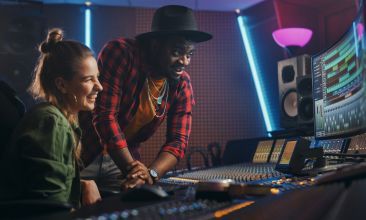Want to improve your playing faster - without wasting hours in unfocused practice? Whether you’re a beginner or an advanced musician, the secret isn’t just to practice more, but to practice smarter. And with tools like the Wavecolab app, you can finally track your progress, get targeted feedback and make every practice session count.
This guide breaks down the best ways to level up your playing - physically, mentally and musically - while showing you how to use Wavecolab as your go-to music practice tool.
1. Practice Slowly, Practice Right
If you’re trying to play fast too soon, you’re doing it backwards. Real speed starts with precision. Every time you move, your brain sends an electrical signal along a neural path. That signal lays down a thin layer of fat (myelin), insulating the pathway and making future signals travel faster. That’s how reflexes form.
If you practice incorrectly, you're building the wrong neural pathways - and reinforcing mistakes. That’s why slow, accurate playing is key. Play it right. Then repeat. Speed will come as a result, not a goal.
2. Train Your Body: Relaxed Muscles Play Better
Playing music is physical. Whether you’re using your hands, breath, or full body, your muscles need to work efficiently.
A relaxed muscle is ready to act. A tense muscle has to release before it moves - slowing you down. Good posture and tension-free technique prevent cramps and help you play with ease. Check your body. Fix your positioning. The goal is to be ready, not rigid.
Efficient movement beats brute force every time.
3. Practice With Purpose (Not Just Repetition)
Stop running through pieces mindlessly. Every practice session should have a clear, focused goal.
Are you working on:
- Dynamics?
- Speed?
- Tone?
- Agogic phrasing?
- Interpretation?
Pick one thing. Zoom in. Fix it. This kind of targeted practice builds real skills - and avoids wasted time.
4. Use the Wavecolab App to Track, Compare, and Improve
This is where the Wavecolab app shines. It's not just for recording—it's a full-featured music practice tool designed to help you improve faster.
✅ Compare recordings over time
Wavecolab’s side-by-side comparison tool lets you stack two takes and clearly hear the difference. Are your dynamics better? Is your timing tighter? This feature turns vague impressions into concrete progress.
✅ Comment on specific time ranges
Highlight exact spots in your recording and leave comments - like “timing slips here” or “watch the phrasing.” This precision helps you target issues without rewatching whole takes. No more guessing where you went wrong.
✅ Get feedback from teachers or peers
Wavecolab makes it easy to share your music practice recordings and collect clear, focused feedback. Your teacher or colleagues can mark exact moments in your recording and leave notes. It’s like a remote lesson that never gets lost in translation.
Whether you're practicing alone or collaborating, Wavecolab helps you practice smarter - and track real growth.
Try Wavecolab today and transform how you record, review and refine your music.
5. Train Your Ear with Solfeggio
To play music well, you first need to hear it clearly in your head. That’s where solfeggio comes in.
Solfeggio helps you develop “inner hearing”—the ability to mentally hear pitches, rhythms, and phrases before playing them. If you can sing it, you can play it. This internal guide helps you stay in tune, phrase naturally, and interpret music with real intention.
Try this: sing a phrase before playing it. It doesn’t have to be perfect. Just imagine the sound. It trains your ear, your memory, and your musical instincts.
6. Listen Like a Musician
You’re not just training your fingers - you’re training your ears.
When you record yourself with the Wavecolab app, take the time to really listen:
- Are you staying in rhythm?
- Are the dynamics expressive?
- Is the tone what you want?
Also, listen to great musicians. Analyze what they’re doing. Break down what makes their playing special. Then try to bring some of that into your own sound.
7. Take Advantage of “The Gap”
Learning doesn’t stop when the playing does. In fact, the brain often solidifies movement patterns during brief pauses - what some musicians and meditators call “the gap.”
After a focused repetition, stop. Breathe. Sit still for a few seconds. This pause helps your nervous system integrate what you just did. It’s the same reason sleep strengthens memory.
Use “the gap” as a tool. Let your brain catch up. Then go again.
8. Play for Joy, Not Just Perfection
Sometimes the best thing you can do for your practice is forget the word “practice.”
Just play. Play something you love. Improvise. Explore. Laugh at your mistakes. Enjoy the sound.
Music is emotional. Joy keeps your motivation alive. The more fun you have, the more consistent you’ll be - and consistency is what drives real growth.
9. Bonus Tips That Actually Work
🎯 Set micro-goals: “Fix the fingering in bar 8” is better than “Get better at this piece.”
🎧 Use a metronome: Honest timing leads to confident playing.
⏸️ Take breaks: Muscles and minds both need time to recharge.
🔁 Be consistent: 20 focused minutes every day beats 2 hours once a week.
🧠 Be patient: Progress isn’t always visible - but it’s always happening.
Final Word
If you want to play better, stop guessing - and start practicing with intention. Respect your body. Train your ears. Use your brain. And take full advantage of modern tools like the Wavecolab app to get deeper insight, clearer feedback, and faster progress.
Your growth as a musician is 100% within reach. All it takes is the right approach - and the right tools.



